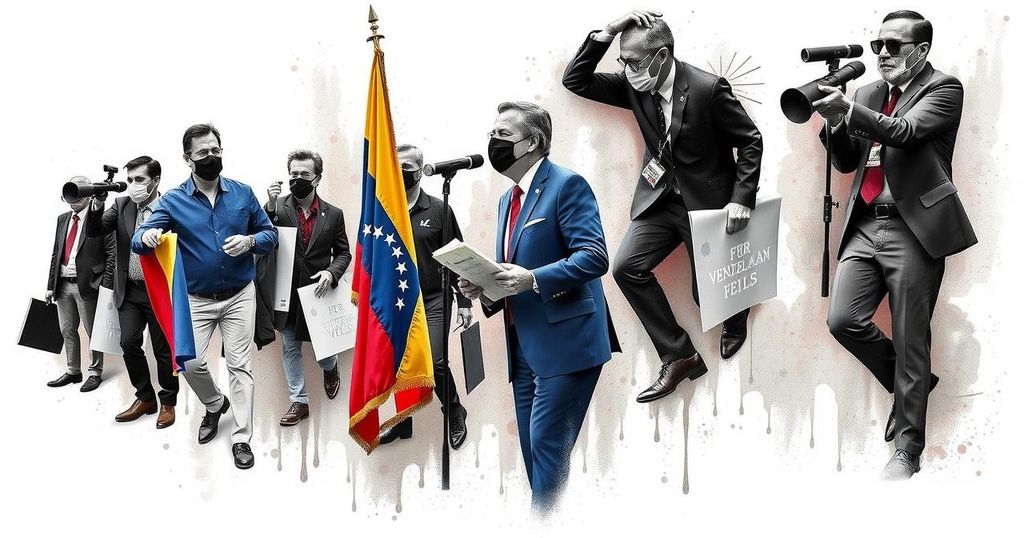Six Venezuelan opposition figures in the former Argentine embassy in Caracas report increasing harassment, including surveillance, utility disruptions, and staff arrests. Argentina, Brazil, and the Organization of American States are urging their safe passage amidst ongoing tensions with Maduro’s government. The situation reflects the fallout from Venezuela’s disputed July election, further complicating an already critical humanitarian and political crisis.
The situation for six Venezuelan opposition figures seeking refuge in the former Argentine embassy in Caracas has become increasingly precarious. These individuals have reported escalating harassment, including surveillance, cuts to basic utilities, and arrests of local embassy staff, underscoring the dire political climate in Venezuela following the disputed presidential election in July. Argentina, Brazil, and the Organization of American States (OAS) are advocating for their safe passage, yet tensions with Nicolás Maduro’s administration remain high.
Since March 2024, the opposition members have resided in the Argentine diplomatic compound after flee…bing escalating threats to their safety. Although initially protected by Argentina, their care was transferred to Brazil in August, only for Maduro’s government to withdraw Brazil’s oversight authority in September. The living conditions for these individuals have deteriorated significantly, with reports indicating increased intimidation and disruption of basic services. In a recent online conference, Magalli Meda, a campaign manager for opposition leader María Corina Machado, highlighted the perilous nature of their situation, pointing out the blatant violations of their human rights.
The Venezuelan government has dismissed these claims, with Interior Minister Diosdado Cabello labeling them as a “farce.” The Maduro administration continues to resist external pressures aimed at facilitating the opposition members’ safe exodus from the country. The ongoing humanitarian crisis is intricately linked to the aftermath of the presidential elections held on July 28, 2024. Maduro was declared the winner by the National Electoral Council but faced significant accusations of electoral fraud, further exacerbating national divisions.
In response to these developments, both Argentina and Brazil have ramped up diplomatic efforts to secure safe passage for the opposition figures. Argentina’s government has urged the OAS to apply pressure on Venezuela, garnering support from numerous member states. Concurrently, Brazilian President Luiz Inácio Lula da Silva has been engaged in mediating talks, emphasizing the need for adherence to international diplomatic norms. Brazil’s ambassador to the OAS reiterated that diplomatic premises are inviolable under international law, yet the Maduro administration’s actions raise questions about their compliance with such norms.
The ongoing crisis for the Venezuelan opposition figures represents not only a humanitarian issue but also a reflection of the broader political instability in Venezuela. Calls for regional and international intervention underscore the urgency of addressing the deteriorating circumstances faced by these individuals. Without decisive action from regional governments, the situation risks further deterioration, placing these opposition members in profound danger as they continue to lack safe haven from the state-sponsored repression they have fled.
The Venezuelan political landscape has been increasingly tumultuous, particularly following the contentious presidential election on July 28, 2024. This election saw Nicolás Maduro declared the winner amidst widespread accusations of fraud, leading to heightened tensions within the country. In this charged environment, six opposition figures sought refuge in the former Argentine embassy, only to face considerable harassment from Maduro’s government. Their plight has drawn international attention, prompting calls for immediate action from Argentina, Brazil, and the Organization of American States (OAS). Given the ongoing repression and deteriorating conditions, the situation represents a pressing humanitarian and diplomatic crisis that requires urgent intervention.
The plight of the six Venezuelan opposition figures illustrates the severe implications of political repression in Venezuela. With Argentina, Brazil, and the OAS advocating for their safe passage, the situation reflects broader tensions stemming from the recent electoral crisis and Maduro’s disregard for international norms. Urgent coordinated regional action is essential to safeguard the rights and safety of these individuals, who continue to be vulnerable to state terrorism. Time is of the essence; failure to act may result in further violations of human rights and deepening humanitarian crises.
Original Source: www.newslooks.com






